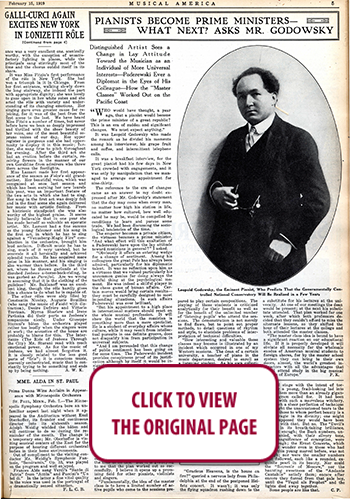 100 YEARS AGO IN MUSICAL AMERICA (271)
100 YEARS AGO IN MUSICAL AMERICA (271)
February 15, 1919
Page 5
PIANISTS BECOME PRIME MINISTERS—WHAT NEXT? ASKS MR. GODOWSKY
Distinguished Artist Sees a Change in Lay Attitude Toward the Musician as an Individual of More Universal Interests—Paderewski Ever a Diplomat in the Eyes of His Colleague—How the “Master Classes” Worked Out on the Pacific Coast
“WHO would have thought, a year ago, that a pianist would become the prime minister of a great republic? This is an era of sudden and significant changes. We must expect anything.”
It was Leopold Godowsky who made the remark as he divided his moments among his interviewer, his grape fruit and coffee, and intermittent telephone calls.
It was a breakfast interview, for the great pianist had his few days in New York crowded with engagements, and it was only by manipulation that we managed to arrange our appointment for nine-thirty.
The reference to the era of changes came as an answer to my doubt expressed after Mr. Godowsky’s statement that the day may come when every man, no matter how high his station in life, no matter how cultured, how well educated he may be; would be compelled by conditions to learn and pursue some trade. We had been discussing the sociological tendencies of the time.
The emperor becomes a private citizen, the virtuoso becomes a prime minister. “And what effect will this exaltation of a Paderewski have upon the lay attitude toward musicians in general?” I asked.
“Obviously it offers an entering wedge for a change of sentiment. Among his colleagues the great Pole has always been admired, particularly for his diplomatic talent. It was no reflection upon him as a virtuoso that we valued particularly his uncommon genius for doing always the tactful thing at the psychological moment. He was indeed a skillful player in the chess game of human affairs. Certain moves would bring certain results—they must be carefully designed to meet impending situations. In such affairs Paderewski was ever brilliant.
“But his appointment to a high place in international matters should react on the whole musical profession. It will show the world that the musician is something more than a mere specialist. He is a student of everyday affairs whose culture, while it may result from intellectual pursuits in one definite groove, does not disqualify him from participation in universal subjects.
“And I am persuaded that this change of public sentiment has been going on for some time. The Paderewski incident provides conspicuous proof of its justification although by itself it would be insignificant. I have noticed in recent conferences that I have had the privilege of enjoying with certain prominent United States Congressmen, that the old-fashioned idea that the musician is merely a troubadour, a roaming minstrel, has passed. I am persuaded furthermore that the legislative attitude toward such a proposal as a national conservatory of music is undergoing a change, and I believe that the project will be realized before many years.”
Mr. Godowsky expressed himself with enthusiasm over the outcome of his master piano classes on the Pacific Coast last summer. These classes were given for periods of five weeks in Los Angeles, San Francisco and Portland, Ore. “They accomplished not only what I anticipated they would but a great deal more,” he observed. “Even now I have enough applications from other cities throughout the country to keep me busy all through the year conducting such classes in various cities. Obviously I cannot spare the time to do this. But it is gratifying to me that the plan worked out so successfully. I believeit opens up a promising field for other pianists, violinists and singers.
Fundamentally, the idea of the master class is to have a limited numbers of active pupils who come to the sessions prepared to play certain compositions. The playing of these students is criticized analytically for their benefit as well as for the benefit of the unlimited number of ‘listening pupils’ who attend the sessions. The demonstration is not merely to find flaws, but to point out proper methods, to detail questions of rhythm and style, to elucidate problems of interpretation of technical difficulties.
“How interesting and valuable these classes may become is illustrated by an incident which occurred in one of my Western sessions. The dean of a certain university, a teacher of piano in the music department, desired to enroll as a listening student. As his own collegiate lectures made it impossible for him to attend all of the sessions, he arranged to take in alternate meetings, providing a substitute for his lectures at the university. At one of our meetings the dean would be present; at the next his substitute attended. That plan worked for one week, after which both professors decided that they couldn’t afford to miss the alternate lessons, so they shifted the hour of their lectures at the college and both attended the master classes.
“The master class idea is bound to have a significant reaction on our educational life. If it is properly developed it will obviate all necessity for the wholesale exodus of American musical students to foreign shores, for by the master school system they can bring to their own doors, almost, the world’s greatest instructors with all the advantages that would attend study in the big musical centers of Europe.” —P. K.




 RENT A PHOTO
RENT A PHOTO





